中考句型转换归纳整理
中考英语句型转换
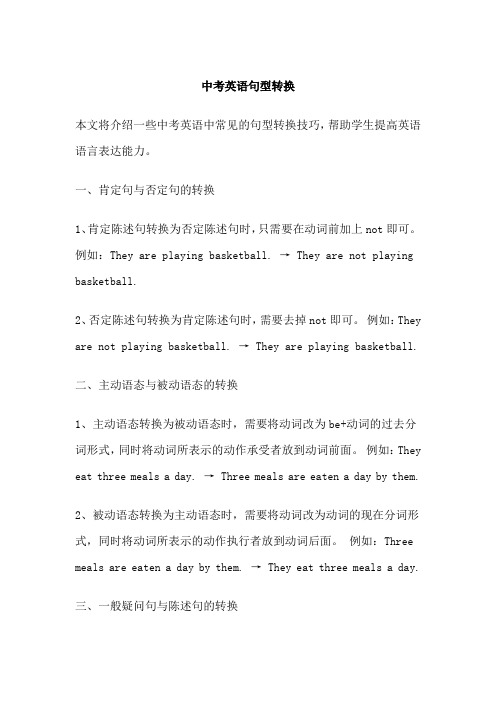
中考英语句型转换本文将介绍一些中考英语中常见的句型转换技巧,帮助学生提高英语语言表达能力。
一、肯定句与否定句的转换1、肯定陈述句转换为否定陈述句时,只需要在动词前加上not即可。
例如:They are playing basketball. → They are not playing basketball.2、否定陈述句转换为肯定陈述句时,需要去掉not即可。
例如:They are not playing basketball. → They are playing basketball.二、主动语态与被动语态的转换1、主动语态转换为被动语态时,需要将动词改为be+动词的过去分词形式,同时将动词所表示的动作承受者放到动词前面。
例如:They eat three meals a day. → Three meals are eaten a day by them.2、被动语态转换为主动语态时,需要将动词改为动词的现在分词形式,同时将动词所表示的动作执行者放到动词后面。
例如:Three meals are eaten a day by them. → They eat three meals a day.三、一般疑问句与陈述句的转换1、一般疑问句转换为陈述句时,需要将动词改为相应的陈述语气,同时将主语放到动词后面。
例如:Are they playing basketball? →They are playing basketball.2、陈述句转换为一般疑问句时,需要将动词改为一般疑问语气,同时将主语放到动词前面。
例如:They are playing basketball. →Are they playing basketball?四、时间状语从句的转换1、现在时态的时间状语从句转换为过去时态的时间状语从句时,需要将动词改为过去时态。
例如:I will go to the park tomorrow. → I went to the park yesterday.2、过去时态的时间状语从句转换为现在时态的时间状语从句时,需要将动词改为现在时态。
句型转换知识点九年级

句型转换知识点九年级一、什么是句型转换句型转换指的是在语法和句子结构不变的情况下,通过改变词语的形式或者位置,使句子的表达方式发生变化。
通过句型转换,我们可以更加灵活地表达相同的意思,丰富语言的变化和表达能力。
在九年级的英语学习中,句型转换是一个重要的知识点,能够帮助学生提升语言的熟练度和准确性。
二、主谓转换主谓转换是句型转换中的一种常见形式。
主谓转换通过改变句子中主语和谓语动词的形式或者位置,使句子的表达方式产生变化。
主谓转换通常用于强调句子中的某一要素,使句子更加生动有力。
举例:1. 原句:She sings beautifully.转换后:Beautifully does she sing.2. 原句:They are playing football.转换后:Playing football are they.三、否定句转换否定句转换是句型转换中的另一种常见形式。
否定句转换通过在句子中加入否定词或者改变句子结构,使句子的意思相反。
否定句转换能够帮助我们更加准确地表达自己的意思,并且使句子的表达更加丰富多样。
举例:1. 原句:He has finished his homework.转换后:He hasn't finished his homework.2. 原句:We will go to the park tomorrow.转换后:We won't go to the park tomorrow.四、疑问句转换疑问句转换是句型转换中的又一常见形式。
疑问句转换通过改变句子结构或者词语顺序,将陈述句转换为疑问句,以询问某些信息或者确认某些情况。
疑问句转换能够帮助我们更好地进行沟通和交流,提高语言的应用能力。
举例:1. 原句:He is a teacher.转换后:Is he a teacher?2. 原句:They have finished their lunch.转换后:Have they finished their lunch?五、倒装句转换倒装句转换是句型转换中的一种特殊形式。
中考常考的词汇拼写和句型转换技巧归纳
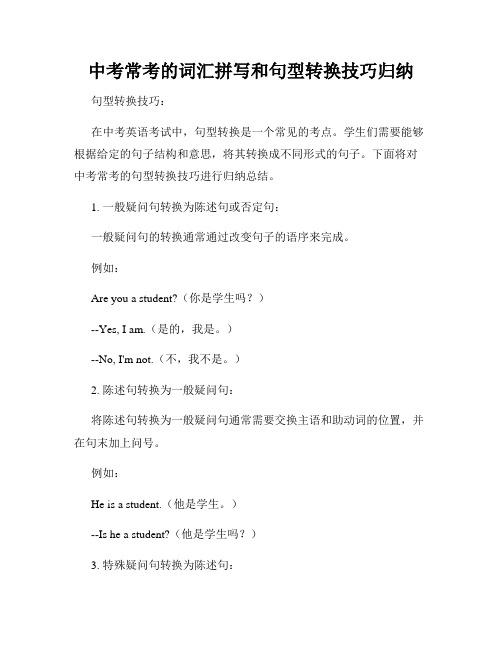
中考常考的词汇拼写和句型转换技巧归纳句型转换技巧:在中考英语考试中,句型转换是一个常见的考点。
学生们需要能够根据给定的句子结构和意思,将其转换成不同形式的句子。
下面将对中考常考的句型转换技巧进行归纳总结。
1. 一般疑问句转换为陈述句或否定句:一般疑问句的转换通常通过改变句子的语序来完成。
例如:Are you a student?(你是学生吗?)--Yes, I am.(是的,我是。
)--No, I'm not.(不,我不是。
)2. 陈述句转换为一般疑问句:将陈述句转换为一般疑问句通常需要交换主语和助动词的位置,并在句末加上问号。
例如:He is a student.(他是学生。
)--Is he a student?(他是学生吗?)3. 特殊疑问句转换为陈述句:特殊疑问句转换为陈述句需要将原句的疑问词替换为陈述句中对应的词语。
例如:What is your name?(你叫什么名字?)--My name is Mike.(我的名字叫迈克。
)4. 否定句转换为肯定句或一般疑问句:否定句转换为肯定句通常需要去掉否定词,并改变动词形式为肯定形式。
例如:I don't like bananas.(我不喜欢香蕉。
)--I like bananas.(我喜欢香蕉。
)否定句转换为一般疑问句则要交换助动词和主语的位置,并在句末加上问号。
例如:I don't like basketball.(我不喜欢篮球。
)--Don't you like basketball?(你不喜欢篮球吗?)5. 直接引语转换为间接引语:直接引语转换为间接引语通常需要改变动词的时态和人称,并在引语前后加上引号。
例如:"I like swimming," he said.(他说:“我喜欢游泳。
”)--He said that he liked swimming.(他说他喜欢游泳。
)词汇拼写技巧:除了句型转换,词汇拼写是中考英语考试中另一个常见的考点。
九年级中考复习之句型转换
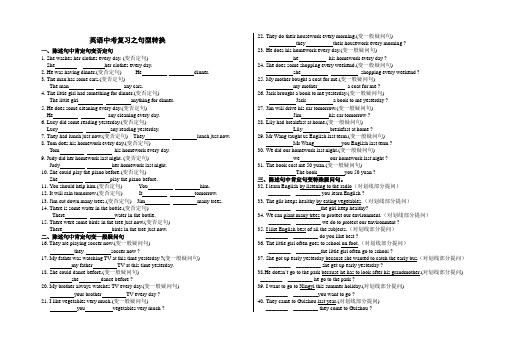
英语中考复习之句型转换一、陈述句中肯定句变否定句1. She washes her clothes every day. (变否定句)She her clothes every day.2.He was having dinner.(变否定句) He dinner.3.The man has some cars.(变否定句)The man any cars.4.The little girl had something for dinner.(变否定句)The little girl anything for dinner.5.He does some cleaning every day.(变否定句)He any cleaning every day.6.Lucy did some reading yesterday.(变否定句)Lucy any reading yesterday.7.They had lunch just now.(变否定句) They lunch just now.8.Tom does his homework every day.(变否定句)Tom his homework every day.9.Judy did her homework last night. (变否定句)Judy her homework last night.10.She could play the piano before.(变否定句)She play the piano before.11.You should help him.(变否定句) You him.12.It will rain tomorrow.(变否定句) It tomorrow.13.Jim cut down many trees.(变否定句) Jim many trees.14.There is some water in the bottle.(变否定句)There water in the bottle.15.There were some birds in the tree just now.(变否定句)There birds in the tree just now.二、陈述句中肯定句变一般疑问句16. They are playing soccer now.(变一般疑问句)they soccer now ?17. My father was watching TV at this time yesterday ?(变一般疑问句)my father TV at this time yesterday.18.She could dance before.(变一般疑问句)she dance before ?20.My brother always watches TV every day.(变一般疑问句)your brother TV every day ?21.I like vegetables very much.(变一般疑问句)you vegetables very much ? 22.They do their housework every morning.(变一般疑问句)they their housework every morning ?23.He does his homework every day.(变一般疑问句)he his homework every day ?24.She does some shopping every weekend.(变一般疑问句)she shopping every weekend ?25.My mother bought a coat for me.(变一般疑问句)my mother a coat for me ?26.Jack brought a book to me yesterday.(变一般疑问句)Jack a book to me yesterday ?27.Jim will drive his car tomorrow.(变一般疑问句)Jim his car tomorrow ?28.Lily had breakfast at home.(变一般疑问句)Lily breakfast at home ?29.Mr Wang taught us English last term.(变一般疑问句)Mr Wang you English last term ?30.We did our homework last night.(变一般疑问句)we our homework last night ?31.The book cost me 50 yuan.(变一般疑问句)The book you 50 yuan ?三、陈述句中肯定句变特殊疑问句。
中考英语句型转换1
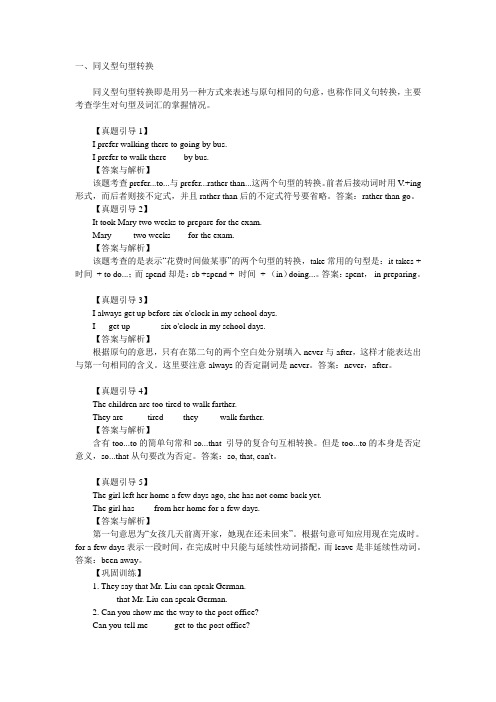
一、同义型句型转换同义型句型转换即是用另一种方式来表述与原句相同的句意,也称作同义句转换,主要考查学生对句型及词汇的掌握情况。
【真题引导1】I prefer walking there to going by bus.I prefer to walk there ___ by bus.【答案与解析】该题考查prefer...to...与prefer...rather than...这两个句型的转换。
前者后接动词时用V.+ing 形式,而后者则接不定式,并且rather than后的不定式符号要省略。
答案:rather than go。
【真题引导2】It took Mary two weeks to prepare for the exam.Mary ____ two weeks ___ for the exam.【答案与解析】该题考查的是表示“花费时间做某事”的两个句型的转换,take常用的句型是:it takes +时间+ to do...;而spend却是:sb +spend + 时间+ (in)doing...。
答案:spent,in preparing。
【真题引导3】I always get up before six o'clock in my school days.I __ get up ______ six o'clock in my school days.【答案与解析】根据原句的意思,只有在第二句的两个空白处分别填入never与after,这样才能表达出与第一句相同的含义。
这里要注意always的否定副词是never。
答案:never,after。
【真题引导4】The children are too tired to walk farther.They are_____ tired ____they ____ walk farther.【答案与解析】含有too...to的简单句常和so...that 引导的复合句互相转换。
初中英语总复习之句型转换总结
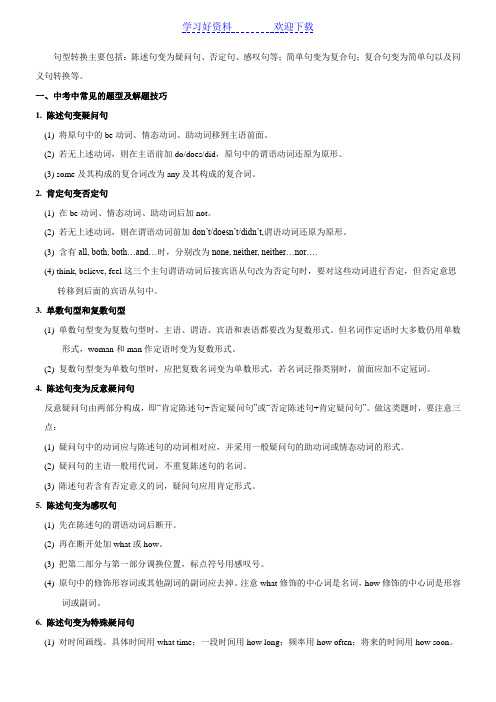
句型转换主要包括:陈述句变为疑问句、否定句、感叹句等;简单句变为复合句;复合句变为简单句以及同义句转换等。
一、中考中常见的题型及解题技巧1. 陈述句变疑问句(1) 将原句中的be动词、情态动词、助动词移到主语前面。
(2) 若无上述动词,则在主语前加do/does/did,原句中的谓语动词还原为原形。
(3) some及其构成的复合词改为any及其构成的复合词。
2. 肯定句变否定句(1) 在be动词、情态动词、助动词后加not。
(2) 若无上述动词,则在谓语动词前加don’t/doesn’t/didn’t,谓语动词还原为原形。
(3) 含有all, both, both…and…时,分别改为none, neither, neither…nor….(4) think, believe, feel这三个主句谓语动词后接宾语从句改为否定句时,要对这些动词进行否定,但否定意思转移到后面的宾语从句中。
3. 单数句型和复数句型(1) 单数句型变为复数句型时,主语、谓语、宾语和表语都要改为复数形式。
但名词作定语时大多数仍用单数形式,woman和man作定语时变为复数形式。
(2) 复数句型变为单数句型时,应把复数名词变为单数形式,若名词泛指类别时,前面应加不定冠词。
4. 陈述句变为反意疑问句反意疑问句由两部分构成,即“肯定陈述句+否定疑问句”或“否定陈述句+肯定疑问句”。
做这类题时,要注意三点:(1) 疑问句中的动词应与陈述句的动词相对应,并采用一般疑问句的助动词或情态动词的形式。
(2) 疑问句的主语一般用代词,不重复陈述句的名词。
(3) 陈述句若含有否定意义的词,疑问句应用肯定形式。
5. 陈述句变为感叹句(1) 先在陈述句的谓语动词后断开。
(2) 再在断开处加what或how。
(3) 把第二部分与第一部分调换位置,标点符号用感叹号。
(4) 原句中的修饰形容词或其他副词的副词应去掉。
注意what修饰的中心词是名词,how修饰的中心词是形容词或副词。
中考重点句型转换与句子改错
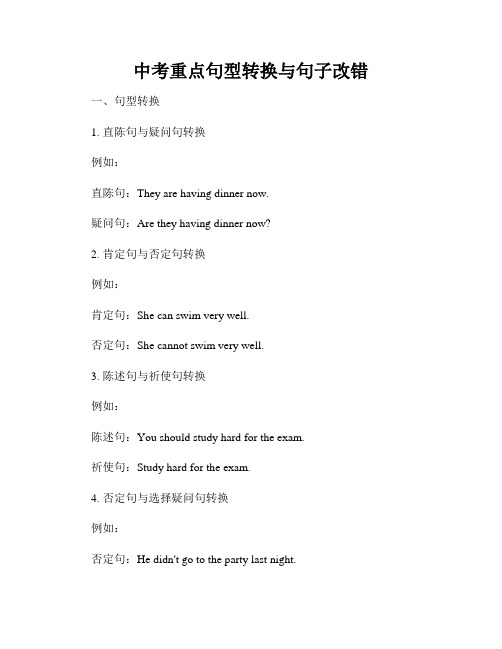
中考重点句型转换与句子改错一、句型转换1. 直陈句与疑问句转换例如:直陈句:They are having dinner now.疑问句:Are they having dinner now?2. 肯定句与否定句转换例如:肯定句:She can swim very well.否定句:She cannot swim very well.3. 陈述句与祈使句转换例如:陈述句:You should study hard for the exam.祈使句:Study hard for the exam.4. 否定句与选择疑问句转换例如:否定句:He didn't go to the party last night.选择疑问句:Did he go to the party last night?5. 特殊疑问句转换为陈述句例如:特殊疑问句:What is your favorite color?陈述句:My favorite color is blue.二、句子改错(以下为例句,具体句子改错内容可自行拓展)1. We will go to the park after we finished our homework.改正:We will go to the park after we finish our homework.2. The girl is very kind and always help others.改正:The girl is very kind and always helps others.3. What interesting news did you hear from your friend?改正:What interesting news did you hear from your friends?4. He told me that don't forget to bring my umbrella.改正:He told me not to forget to bring my umbrella.5. Are you going to visit your grandparents or go shopping this weekend?改正:Are you going to visit your grandparents or are you going shopping this weekend?6. The weather is very nice, so we decided to take a walk and went to the park.改正:The weather is very nice, so we decided to take a walk and go to the park.7. Can you let me know where is the nearest bus stop?改正:Can you let me know where the nearest bus stop is?8. My brother said if he has enough time, he will go to the party with us.改正:My brother said if he has enough time, he would go to the party with us.三、总结以上是中考重点句型转换与句子改错的内容。
25个英语中考常考句型转换知识点
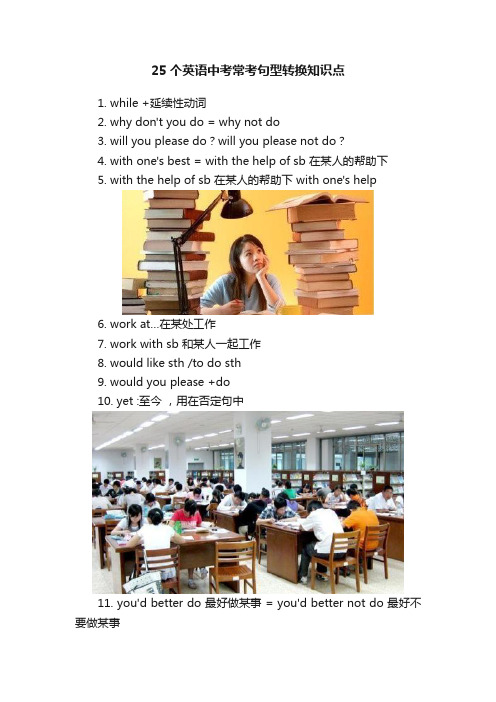
25个英语中考常考句型转换知识点1. while +延续性动词2. why don't you do = why not do3. will you please do?will you please not do?4. with one's best = with the help of sb 在某人的帮助下5. with the help of sb 在某人的帮助下 with one's help6. work at…在某处工作7. work with sb 和某人一起工作8. would like sth /to do sth9. would you please +do10. yet :至今,用在否定句中11. you'd better do 最好做某事 = you'd better not do 最好不要做某事12. 系动词(taste吃起来/sound听起来/look看起来/semll闻起来)+adj13. 名词、副词、形容词修饰 enongh 时, 形容词放在之前,名词副词放在之后14. 太多 too much +不可数 too many +可数 much too 相当于very ,修饰形容词15. 向宾语提问:Whom16. 向地点提问:Where17. 向方式提问:How18. 向价格和不可数名词提问:How much19. 向可数名词提问:How many20. 向频率提问: How often21. 向时间段提问:How long22. 向时间提问:what time/when23. 向物主代词提问:Whose24. 向职业提问:what do/does……do25. 向主语提问: Who。
中考英语语法大全之句型转换
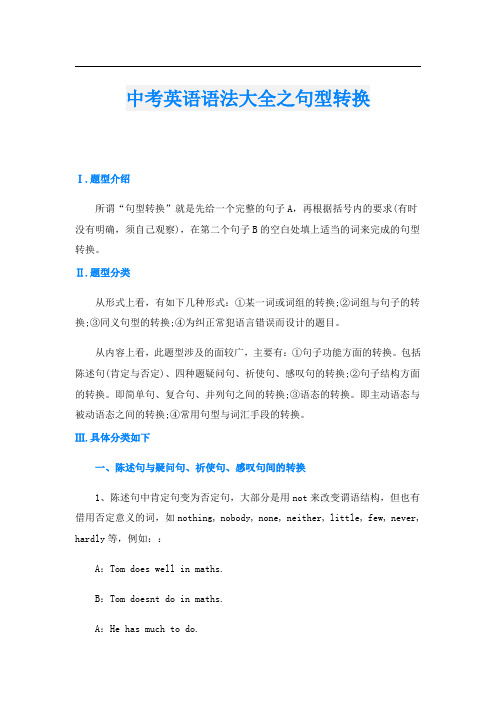
中考英语语法大全之句型转换Ⅰ.题型介绍所谓“句型转换”就是先给一个完整的句子A,再根据括号内的要求(有时没有明确,须自己观察),在第二个句子B的空白处填上适当的词来完成的句型转换。
Ⅱ.题型分类从形式上看,有如下几种形式:①某一词或词组的转换;②词组与句子的转换;③同义句型的转换;④为纠正常犯语言错误而设计的题目。
从内容上看,此题型涉及的面较广,主要有:①句子功能方面的转换。
包括陈述句(肯定与否定)、四种题疑问句、祈使句、感叹句的转换;②句子结构方面的转换。
即简单句、复合句、并列句之间的转换;③语态的转换。
即主动语态与被动语态之间的转换;④常用句型与词汇手段的转换。
Ⅲ.具体分类如下一、陈述句与疑问句、祈使句、感叹句间的转换1、陈述句中肯定句变为否定句,大部分是用not来改变谓语结构,但也有借用否定意义的词,如nothing, nobody, none, neither, little, few, never, hardly等,例如::A:Tom does well in maths.B:Tom doesnt do in maths.A:He has much to do.B:He has nothing to do.A:All of my classmates like art.B:None of my classmates likes art.2、改为疑问句。
根据上下句的结构和词的减少,来判断变为哪一种形式的疑问句。
例如:A:My brother often has breakfast at school.B: Does your brother often have breakfast at school?A:Toms already weak in English.B:Toms already weak in English, isnt he ?A:The red light changes every two minutes.B:How often does the red light change?3、改为感叹句。
中考英语同义句句型转换大全
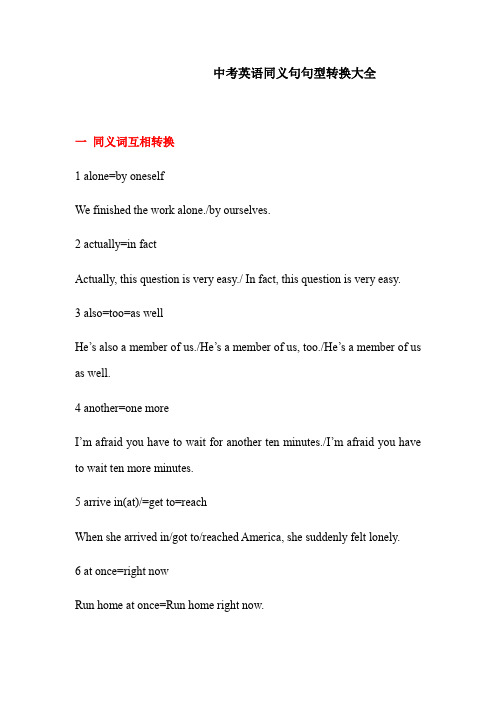
中考英语同义句句型转换大全一同义词互相转换1 alone=by oneselfWe finished the work alone./by ourselves.2 actually=in factActually, this question is very easy./ In fact, this question is very easy.3 also=too=as wellHe’s also a member of us./He’s a member of us, too./He’s a member of us as well.4 another=one moreI’m afraid you have to wait for another ten minutes./I’m afraid you have to wait ten more minutes.5 arrive in(at)/=get to=reachWhen she arrived in/got to/reached America, she suddenly felt lonely.6 at once=right nowRun home at once=Run home right now.7 continue/go onLet’s continue/go on reading the passage.8 cost=spend=take=pay(1)I spent ten yuan of/(in) buying this book../This book cost me tenyuan./I paid ten yuan for this book.(2)It took us three days to fulfill this task./We spent three days on thistask/in fulfilling this task.9 cross=go acrossBefore crossing/going across the road, please look both sides.10 sometimes/=t timesHe is a good man, but he can be really bad-tempered sometimes./at times.11 die/=ose one’s lifeThose people died/lost their lives during the earthquake.12 now/at the momentShe is talking about the problem with her classmates now./at the moment 13 else=otherWhat else/other things can you see in the picture?14 then=t that moment/at that timeShe was shopping then/at that moment/at that time, so she knew nothing about it.15 like/love/enjoy/be fond of/be interested in/care forShe likes/enjoys/loves/is fond of/is interested in/cares for collecting stamps very much.16 will/be going to/be about toThe teachers will/are going to/are about to have a meeting tomorrow afternoon.17 want/would likeDo you want to go abroad to study further?/Would you like to go abroad to study further/18 can/be able to/have the ability to doCan you tell me the way to the library?/Are you able to tell me the way to the library?/Do you have the ability to tell me the way to the library?19 visit/call onLin Tao visited/called on his grandparents last week.20 favorite/like bestWhat’s your favorite sport?/What sport do you like best?21 happen/take placeWhat happened?/What took place?22 decide/make a decision/make up one’s mindShe can’t decide/make a decision/make up her mind where to go.23 found/establish/set upThe students founded/established/set up a group to protect the environment.24 finally/at last/in the endFinally/At last/In the end, she won the race.25 leave/be awayHe left yesterday./He has been away for a day.26 return/give backHe hasn’t returned the book to me./He hasn’t given the book back to me. return/go backHe will go back/return in a month.27 why/what for/how come-She cried so badly. –How come?What did she cry so sadly for?/Why did she cry so badly?28 over/more thanOver/More than a hundred people tried this new kind of food.29 whatever/no matter whatWhatever/No matter what you find in the box, they belong to Amy.30 whenever/no matter whenWhenever/No matter when you come to see me, I will treat you as my relative.31 walk/ go…on footDo you walk to school every day?/Do you go to school on foot every day?32 should/ought to/be supposed toWe should/ought to/are supposed to use both sides of the paper to reduce wastes.33 population/peopleWhat is the population of China?/How many people are there in China?34 quit/stop/drop/give upMy father quitted/stopped/dropped/gave up smoking.35 maybe/perhaps/may beMaybe/Perhaps it is not my pen./ The pen may not be mine.二同义词组互相转换1 a lot of/lots ofA lot of/Lots of artists will show their faces at the party.2 all over the world/around the worldEnglish is spoken widely all over the world./around the world3 not as(so)…as/less thanThis book is not as(so) interesting as that one./That book is more interesting than this one.4 as…as possible/as…as sb canRun home as fast as possible/as fast as you can to tell your mother the good news.5 at risk/in danger/in troubleThe pandas in our country are at risk./in trouble/in danger6 at the age of…/when sb.+be+…years oldHis parents died when he was six years old./His parents died at the age of six.7 because of/due to/as a result of/with one’s help/thanks toBecause of?/Due to/As a result of his help, he passed this exam.With his help/With the help of him, he passed the exam./Thanks to his help, he passed the exam.8 be careful/look out/take careLook out!/Be careful/Take care! The flood is coming.9 be worried about/worry aboutLiu Ming is worried about his following oral test./Liu Ming can’t stop his following oral test.10 both…and…/not only…but also…He is not only a singer but also a doctor./He is both a singer and a doctor.11 be good at/do well inHe is good at drawing./He does well in drawing.12 be proud of/take pride inWe are all proud of our country’s astronaut./He takes pride in ourcountry’s astronaut.13 come up with/think of/have an ideaTome came up an idea./Tom thought of an idea./Tom had an idea.14 ride a bike/go…by bikeHe often rides a bike to work./He often goes to work by bike.15 come from/be fromWhere do you come from?/Where are you from?16 have a good time/enjoy oneself//play happilyWe had a good time/enjoyed ourselves/played happily on Christmas Day.17 have a pain in head/have a headacheHe didn’t go to school today, because he had a pain in head./had a headache18 hear from/receive(get) a letter fromShe is very happy to hear from/receive a letter from a Canadian friend. 19 had better do/It’s best to doYou had better read in the sun./It’s best for you to read in the sun.20 how about/what aboutHow about/What about going skating?21 in order to/in order that/to do/so thatHe worked day and night to be a successful man./He worked day and night in order to be a successful man./He worked day and night in order that he could be a successful man./He worked day and night so that he could be a successful man.22 keep off/keep away fromKeep off /Keep away from the grass!23 in/wearShe is in/wears a white dress today.24 keep sb. from doing/stop sb. (from) doing/prevent sb. (from) doing Trees can stop the soil flowing away./ Trees can prevent the soil flowing away./Trees can keep the soil from flowing away.25 learn …by oneself/ teach oneselfNobody taught him. He learnt it by himself./He taught himself.26 like …better than/prefer…to…/prefer to do…rather than do …John likes swimming better than skating./John prefers swimming to skating./John prefer to swim rather than skate.27 long, long ago/once upon a timeLong, long ago/Once upon a time, there was a beautiful princess living in an old castle.28 look after well/take good care ofThanks for looking after my cat /taking good care of my cat well while I was away.29 no longer/not …any longerShe is no longer a little girl./She is not a little girl any longer.30 shall we/Let’s..Shall we watch the film together?/Let’s watch the film together.31 take part in/join in/participate inHe took part in /joined in/participated in the match.32 too…to/so…that…/enough to…He is too busy to visit us./He is so busy that he can’t visit us./He is not free enough to visit us.三同义句型互相转换1运用两种时态(一般过去时和现在完成时互相转换)(1)He left last year.(2)He has been away for one year.(3)He has been away since a year ago.(4)It is a year since he left.(5)One year has passed since he left.2最高级和比较级的互相转换(1)He is the tallest student in his class.(2)He is taller than any other student in his class.(3)He is taller than the other students in his class.(4)No one else is taller than him in his class.3运用两种语态(主动语态和被动语态互相转换)I clean my room every day./My room is cleaned every day. 4感叹句的两种句型之间互相转换What a careful girl she is!/How careful the girl is!5运用关联词语合并句子(1)Amy can’t dance. Susan can’t, either.Neither Amy nor Susan can dance.(2)I has eaten breakfast and my mother has eaten it, too.Both my mother and I have eaten breakfast.6运用复合句和不定式互相转换(1)I hope that I can visit the moon one day./I hope to visit the moon oneday.(2)He told me how he could use a computer./He told me how to use acomputer.7运用不同的句式结构互相转换(1)She wants to go shopping and her friends want to go shopping,too./She wants to go shopping, and so do her friends.(2)He went to bed after he finished his homework./He went to bed afterfinishing his homework./He didn’t go to bed until he finished his homework.(3)Come on, or we’ll miss the early bus./If we don’t hurry, we’ll miss theearly bus.(4)The man gave us a talk last week, and he will give us another talk thisweek./The man who gave us a talk last week will give us another talk this week.8用it做形式主语互相转换(1)He can finish the work easily./It is easy for him to finish the work.(2)We found it hard to shake./We found it was hard to skate.。
中考英语专题3:句型转换
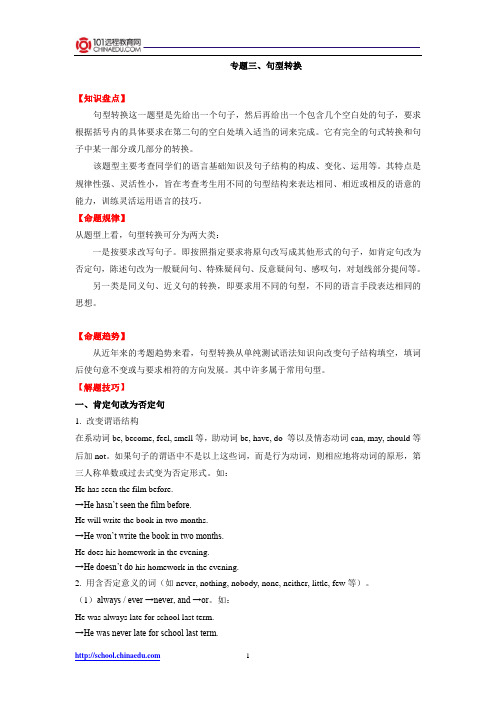
专题三、句型转换【知识盘点】句型转换这一题型是先给出一个句子,然后再给出一个包含几个空白处的句子,要求根据括号内的具体要求在第二句的空白处填入适当的词来完成。
它有完全的句式转换和句子中某一部分或几部分的转换。
该题型主要考查同学们的语言基础知识及句子结构的构成、变化、运用等。
其特点是规律性强、灵活性小,旨在考查考生用不同的句型结构来表达相同、相近或相反的语意的能力,训练灵活运用语言的技巧。
【命题规律】从题型上看,句型转换可分为两大类:一是按要求改写句子。
即按照指定要求将原句改写成其他形式的句子,如肯定句改为否定句,陈述句改为一般疑问句、特殊疑问句、反意疑问句、感叹句,对划线部分提问等。
另一类是同义句、近义句的转换,即要求用不同的句型,不同的语言手段表达相同的思想。
【命题趋势】从近年来的考题趋势来看,句型转换从单纯测试语法知识向改变句子结构填空,填词后使句意不变或与要求相符的方向发展。
其中许多属于常用句型。
【解题技巧】一、肯定句改为否定句1. 改变谓语结构在系动词be, become, feel, smell等,助动词be, have, do 等以及情态动词can, may, should等后加not。
如果句子的谓语中不是以上这些词,而是行为动词,则相应地将动词的原形,第三人称单数或过去式变为否定形式。
如:He has seen the film before.→He hasn’t seen the film before.He will write the book in two months.→He won’t write the book in two months.He does his homework in the evening.→He doesn’t do his homework in the evening.2. 用含否定意义的词(如never, nothing, nobody, none, neither, little, few等)。
中考英语句型转换(全)
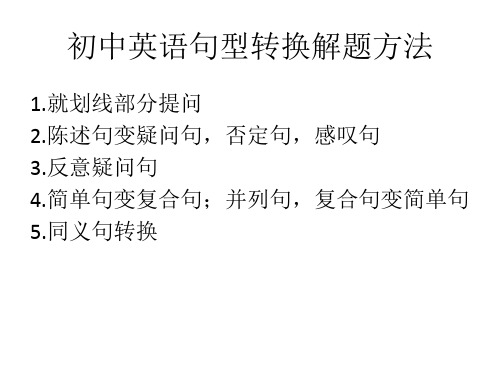
What are the children doing on the hill? 3. She has four lessons in the morning. 具体步骤:(一)画线部分是数量词作定语,疑问 词用how many,而且lessons应紧跟其后;
(二)判定疑问词后接一般疑问句语序,因是一般 现在时,且主语为单数,故主语前加助动词does, 将谓语动词has还原成have; (三)抄写剩余部分,并注意大小写和标点符号 How many lessons does she have in the morning?
(二)对其他成分提问,做法是:疑问词放在句首, 然后再把原句改为一般疑问句。如: 1. 对宾语提问: Tom is going to buy some books. →What is Tom going to buy? 2. 对表语提问: These are books. →What are these? 3.. 对宾语部分中的定语以及 “there be”句型中的主 语的定语提问时,应把被修饰的名词连同疑问词 一起放在句首。如: ①They have six classes on Monday.(对宾语部分中 的定语提问) →How many classes do they have on Monday?
对划线部分提问练习 His father is an engineer.(对划线部分提问) ______ his father’s ___ ____? Mr King is from America.(对划线部分提问) ______ is Mr King _____ ___? Jenny is English.(对划线部分提问) What’s ________ ______ ___? I have three cousins.(对划线部分提问) __________________________? These are Jenny’s CDs.(对划线部分提问) _____________________________?
中考英语句型转换考点总结
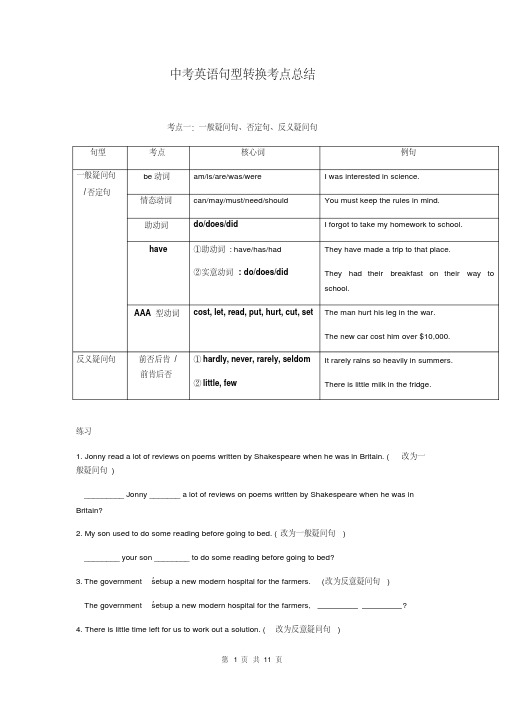
中考英语句型转换考点总结考点一:一般疑问句、否定句、反义疑问句句型考点核心词例句一般疑问句/否定句be动词am/is/are/was/were I was interested in science.情态动词can/may/must/need/should You must keep the rules in mind.助动词do/does/did I forgot to take my homework to school.have ①助动词: have/has/had②实意动词: do/does/did They have made a trip to that place.They had their breakfast on their way to school.AAA型动词cost, let, read, put, hurt, cut, set The man hurt his leg in the war.The new car cost him over $10,000.反义疑问句前否后肯/前肯后否①hardly, never, rarely, seldom②little, fewIt rarely rains so heavily in summers.There is little milk in the fridge.练习1. Jonny read a lot of reviews on poems written by Shakespeare when he was in Britain. (改为一般疑问句)_________ Jonny _______ a lot of reviews on poems written by Shakespeare when he was in Britain?2. My son used to do some reading before going to bed. (改为一般疑问句)________ your son ________ to do some reading before going to bed?3. The government’sset up a new modern hospital for the farmers. (改为反意疑问句)The government’sset up a new modern hospital for the farmers, ?4. There is little time left for us to work out a solution. (改为反意疑问句)第 1 页共11 页。
中考宝典:初中英语句型转换方法归类整理,超级全

中考宝典:初中英语句型转换方法归类整理,超级全
每年的中考英语试卷中,“句型转换”题所占分值较大,也是是近几年来全国各省市中考英语经常考的题型之一,它主要考查学生对句子结构的构成,变化等方面知识的运用能力. 它涉及到的语法知识面很广泛,例如:人称、复数、时态、语态等。
句型转换是英语常见语法中较为简单的一种,但是很多孩子因为语法基础知识不牢靠,把简单的问题复杂化,导致考试中句型转换题目经常丢分。
下面,小编就分享一下初中英语句型转换的方法大全,家长们收藏起来辅导孩子学习练习吧!。
句型转换初三
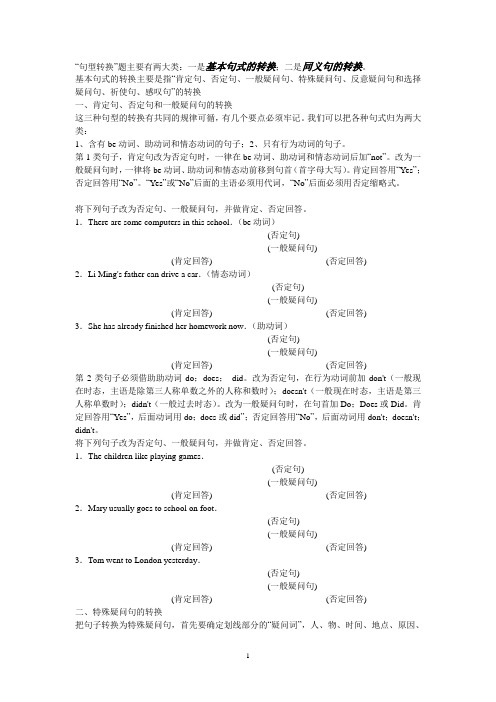
“句型转换”题主要有两大类:一是基本句式的转换;二是同义句的转换。
基本句式的转换主要是指“肯定句、否定句、一般疑问句、特殊疑问句、反意疑问句和选择疑问句、祈使句、感叹句”的转换一、肯定句、否定句和一般疑问句的转换这三种句型的转换有共同的规律可循,有几个要点必须牢记。
我们可以把各种句式归为两大类:1、含有be动词、助动词和情态动词的句子;2、只有行为动词的句子。
第1类句子,肯定句改为否定句时,一律在be动词、助动词和情态动词后加“not”。
改为一般疑问句时,一律将be动词、助动词和情态动前移到句首(首字母大写)。
肯定回答用“Yes”;否定回答用“No”。
“Yes”或“No”后面的主语必须用代词,“No”后面必须用否定缩略式。
将下列句子改为否定句、一般疑问句,并做肯定、否定回答。
1.There are some computers in this school.(be动词)____________________________________________(否定句)____________________________________________(一般疑问句)______________________(肯定回答)__________________________(否定回答)2.Li Ming's father can drive a car.(情态动词)____________________________________________(否定句)____________________________________________(一般疑问句)______________________(肯定回答)__________________________(否定回答)3.She has already finished her homework now.(助动词)____________________________________________(否定句)____________________________________________(一般疑问句)______________________(肯定回答)__________________________(否定回答)第2类句子必须借助助动词do;does;did。
- 1、下载文档前请自行甄别文档内容的完整性,平台不提供额外的编辑、内容补充、找答案等附加服务。
- 2、"仅部分预览"的文档,不可在线预览部分如存在完整性等问题,可反馈申请退款(可完整预览的文档不适用该条件!)。
- 3、如文档侵犯您的权益,请联系客服反馈,我们会尽快为您处理(人工客服工作时间:9:00-18:30)。
中考句型转换归纳整理同义句转换是中考命题的一大热点。
现将常见的同义句转换形式作一归纳,希望对同学们的中考复习有所帮助。
一、用同义词(组)或近义词(组)改写。
1. The children are wearing beautiful clothes.The children are_________beautiful clothes.2. Every day, Yao Ming receives E-mails from thousands of basketball fans.Every day, Yao Ming_________thousands of basketball fans.3. Mr. Smith is working.Mr. Smith is__________ __________.答案:1. in 2. hears from 3. at work简析:英语中有不少同义、近义词(组),在平时学习中要注意总结归纳。
如:enjoy oneself/have a good time, look after/take care of,difficult/hard, can/be able to,over/more than,receive (get)a letter from/hear from等等。
二、用反义词(组)改写。
4. Chinese is more popular than Japanese.Japanese is_________popular__________Chinese.5. The runner couldn't catch up with the others in the race.The runner_________ __________the others in the race.6. A computer is more useful than a VCD.A VCD is not_________useful_________a computer.答案:4. less, than 5. fell behind 6. as,as简析:此类转换应注意有时主语位置会改变,并要特别总结归纳反义词(组)。
如:new-old, big-small,long-short, more than-less than等。
三、用同义句型改写。
7. Ann spent two weeks getting ready for the exams.It________Ann two weeks to__________ready for the exams.8. She spent 30 dollars on the English-Chinese dictionary.The English-Chinese dictionary__________ ___________30 dollars.答案:7. took, get 8. cost her简析:此类转换必须弄清每个句型的构成特点,而且还要注意句中每个句型的固定搭配。
如:give sb. sth.与give sth. to sb.的转换,spend some time(in)doing sth./ on sth.与It takes sb.some time to do sth.的转换等等。
四、二句并一句转换为简单句。
9. Jim doesn't like noodles,and Jack doesn't,either._________Jim_________Jack likes noodles.10. Mrs. Smith is my teacher. She is also my good friend.Mrs. Smith is_________ _________my teacher_________ _________my good friend.答案:9. Neither,nor 10.not only,but also简析:英语中常用not only... but also, either... or,neither... nor,both... and等连词把两个意义相关的简单句合并成一个简单句。
解题过程中要注意连词的选用和主谓一致原则。
除此之外,还可用too... to,enough to等把两个简单句合并成另一简单句。
如:Tom is young. He can't go to school.→Tom is too young to go to school.五、用派生词或多义词改写。
11. The snow was heavy last night.It_________ _________last night.答案:snowed heavily简析:句中名词snow和形容词heavy转换成了动词snowed和副词heavily。
六、并列句与复合句的互换。
12. If you play basketball here,you may break the windows._________play basketball here,_________you may break the windows.13. Go on planting trees for two more years and the hill will be covered with green trees.If we go on planting trees,the hill will_________ _________in two_________ _________.答案:12. Don't,or 13. turn green,years' time简析:含有祈使句的并列句,可转换为含if条件句的复合句。
七、简单句与复合句的互换。
14. Do you know how you can get the kite down from the tree?Do you know_________ _________get the kite down from the tree?答案: how to简析:复合句转换为简单句一般侧重于将从句变化为短语或词组,使其句意简单明了。
常见的转换方法有:(1)用不定式替换、用介词短语替换、用名词短语替换、用分词短语替换;(2)将宾语从句简化为"疑问词+不定式";(3)将so... that... (such... that... )引导的状语从句简化为含有too... to... (或enough to)的简单句;(4)将if引导的状语从句简化为"祈使句,and(or)+句子"。
八、综合转换。
15. Something is wrong with that machine.That machine_________ _________.答案: doesn't work简析:综合转换是在整体把握句意的基础上,对原句重新进行概括表达,它在词汇、结构等多方面都有较大的变化。
至于一些特殊形式的变化,同学们在解题过程中要不断归纳总结,彻底掌握它们。
下面就请你做几道练习题一试身手吧!1. Bike is short for bicycle.Bike is_________ _________ _________saying bicycle.2. It took Mary an hour to do her homework last night.Mary_________an hour_________her homework last night.3. They made him work 12 hours a day.He_________ _________ _________ _________ 12 hours a day.4. I am a League member. He is a League member,too._________he_________I _________League members.5. He is so young that he can't join the army.He is_________young_________the army.6. The player smiled and jumped into the river.The player jumped into the river_________ _________ _________.7. Mr. Brown left London six years ago.Mr. Brown_________ _________ _________ _________London for six years.8. The earth is bigger than the moon.The moon is_________ _________ _________ _________the earth.9. He is one of my friends.He is a friend _________ _________.10. The teacher told us that we should not meet at the school gate.The teacher told us_________ _________ _________at the school gate.11. I have something to tell you. It's interesting.I have_________ _________ to tell you.12. I saw them playing basketball there.I saw_________they_________ _________basketball there.13. Listen carefully, and you'll become more interested._________ _________listen carefully, you'll become more interested.14. She has been a nurse for five years.It_________ _________ _________ _________she became a nurse.15. All are here, but our English teacher isn't._________is here_________our English teacher.16. It was so interesting a film that all of us saw it twice.It was_________ _________interesting_________that all of us saw it twice.17. Mother was busy with some housework when I got home.Mother was_________ _________some house-work when I got home.初三英语句型转换推荐1.Something is wrong with my radio.____ ______something wrong with my radio.2.He was old enough to join the army.He was ______ ______ ______ join the army.3.He went to school at the age of seven.He went to school ______ ______ ______ seven.4.It took him quite a long time to get the work done.He ______ quite a long time ______ the work.rade Wu is so careless that he can do the job well.Comrade Wu isnt ______ ______ ______ do the job well.6.The meeting began when all the members were seated.The meeting ______ ______ ______ all the members were seated.7.“Dont lose your key.”she said to her son.She told her son ______ ______ lose ______ key.8.My little brother asked me.“Does the earth move around the sun?”My little brother asked me ______ the earth ______ around the sun.9.What do you think of the colour TV set?______ do you ______ the colour TV set?10.Its not easy for the girl to learn physics.Its ______ for the girl to learn physics.11.Jack got up fifteen minutes ago.Jack ______ ______ ______ ______ fifteen minutes .12.Its eleven oclock. He will be back at twelve.He will be back ______ ______ ______.13.My father knows not only English but also French.My father knows ______ English ______ French.14.We noticed that he was standing at the school gate.We noticed ______ ______ at the school gate.15.Lin Tao runs faster than the other two boys.Lin Tao runs ______ ______ ______ ______ boys.16.We didnt have the meeting in Room 104. We had it in Room 106.We had the meeting ______ in Room 104 ______ in Room 106.17.The policeman said to the boy,“Dont play on the road.”The policeman ______ the boy ______ ______ play on the road.18.The box is so heavy that nobody can lift it.The box is ______ heavy ______lift.19.He spent three days going over his lessons.It ______ him three days ______ ______ over his lessons.20.This coat fits me. That coat fits me. too.______ this coat ______ that one ______ me.21.She got here this time last month. and she is still here.She has been here ______ ______ ______.22.My father began to work in the factory in 1982. And he still works there.My father ______ ______ in the factory ______ 1982.23.She was vary excited at the news. She couldnt say a word.She was ______ excited at the news ______ she couldnt say a word.24.Whats your trouble?Whats ______ ______ you?25.The box is too heavy for us to carry.The box is ______ heavy ______ we ______ carry it.26.The soldier joined the Party in 1996.The soldier ______ ______ ______ the Party for two years.27.My mother doesnt go to work by bus any longer.My mother ______ ______ ______ to work by bus.28.Of all the stars the sun is nearest to the earth.The sun is ______ to the earth ______ the other stars.29.I didnt know anything about Japanese then.I ______ ______ about Japanese then.30.Do you know how I can get to the hospital?Do you know how ______ ______ ______the hospital?31.If you work hard, you will do well in English.______ ______ , you will do well in English.32.I wont do it well, if you dont help me.I wont do it well ______ you help me.33.He came back yesterday afternoon. I gave him the note at onceI gave the note ______ him ______ ______ ______ he came back yesterday.34.Sometimes he keeps working and doesnt have any rest.Sometimes he keeps working ______ ______.35.My TV set doesnt work well.There is ______ ______ ______ my TV set.36.How bright the girl is!______ ______ ______ girl she is!37.I take back my words.I take back ______ ______ ______.38.I got to know Peter three years ago.I ______ ______ Peter ______ three years ago.参考答案:1. another way of 2.spent;on/doing 3. was made to work 4. Both;and;are 5. too;to join 6. witha smile 7. has been away from 8. not as/so big as 9. of mine 10. not to meet 11. something interesting12. that;were playing 13. If you 14. is five years since 15. Everyone/ Everybody,except/but 16. such an;film 17. busy doing答案:1.There is, have, mended2.too young to3.when he was4.spent, on5.careful enough to6.didn′t begin until7.not to, his 8.if, moves9.How, like 10.hard11.has been up for 12.in an hour13.both, and 14.him standing15.fastest of the three/fastest among the three 16.not, but17.asked, not to 18.too, to19.took, to go 20.Both, and, fit21.since last month 22.has worked, since23.so, that 24.wrong with25.so, that, can′t 26.has been in27.no longer goes 28.nearer, than29.knew nothing 30.to get to31.Work hard 32.until33.to, as soon as 34.without rest/resting35.something wrong with 36.What a bright37.what I said 38.have known, since。
